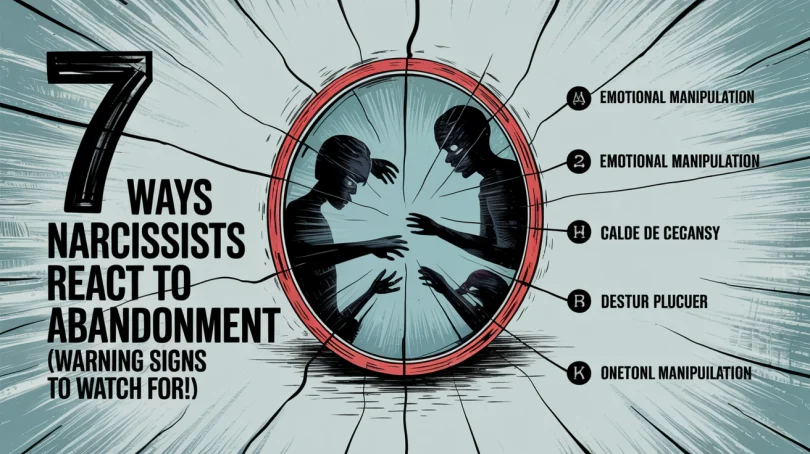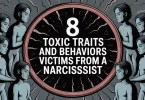Abandonment isn’t pleasant for most people. Many individuals grow up with abandonment issues, which can deeply affect their relationships and emotional well-being. For narcissists, however, abandonment triggers unique and manipulative behaviors rooted in their fear of losing control rather than genuine emotional connection.
Projection of Abandonment Fears
Narcissists often project their fear of abandonment onto their victims. By making their victims feel insecure or afraid of being abandoned, narcissists manipulate them into clinging harder to the relationship. This dynamic ensures the narcissist maintains control, as the victim becomes desperate to avoid rejection.
Why Narcissists Fear Abandonment
Narcissistic individuals fear abandonment, but not because they truly love, care, or value their friendships or relationships. Instead, they view people as sources of “supply” extensions of themselves that provide validation and control. When someone dares to break free or leave a narcissist, it threatens their sense of power, prompting intense emotional reactions and manipulative tactics to regain control or punish the person they believe has betrayed them.
Love-Bombing to Regain Control
If a narcissist hasn’t secured a new source of supply or wants to reassert dominance, they may attempt to “love-bomb” their victim to win them back. Suddenly, they become the perfect parent, partner, friend, or family member, showering the victim with affection, false promises, insincere apologies, and grand gestures of change. This behavior stems from desperation to lure the victim back into their web of lies, not from genuine remorse.
Smear Campaigns and Reputation Damage
If a narcissist believes you’ve abandoned them, they may go to extremes to ruin your credibility. They launch smear campaigns to destroy your reputation, twisting the truth to paint you as the villain and themselves as the victim. They spread lies to turn others against you, enlisting an army of enablers and “flying monkeys” to support their narrative and attack you. If they can’t control you directly, they’ll control how others perceive you.
Rage and Retaliation Tactics
Some narcissists lash out aggressively when they feel abandoned. They may insult, threaten, sabotage, or seek revenge on you for their perceived loss of control. In their eyes, it’s never their fault blame always lies with someone else. They refuse to reflect on their behavior, focusing instead on their reactions. If your responses don’t serve their purposes, they label you as the problem. They exaggerate how much you’ve “hurt” them, seeking sympathy from others to validate their victimhood and mobilize enablers to target you.
Playing the Victim
Narcissists often use guilt as a weapon, saying things like, “After everything I’ve done for you, you just leave me like the rest!” These tactics aim to pull you back into their orbit by making you feel responsible for their pain. They thrive on portraying themselves as the wronged party, never acknowledging their role in the conflict.
Replacing You to Prove Their Worth
Narcissists may replace you immediately, especially if they’ve already lined up a new source of supply. This behavior, known as “monkey-branching,” involves moving from one relationship to the next without pause. A narcissistic parent might favor a sibling, friend, or partner over you, only to return when that relationship falters. A narcissistic partner might turn to a friend, sibling, or new romantic interest, only to come back when their new supply fails to meet their needs.
By quickly finding a new friend, partner, or ally, narcissists aim to prove they’re unaffected by your departure. They may flaunt this new connection to make you feel remorseful, replaceable, or jealous. Ironically, their need to provoke envy often stems from their envy of you.
Stalking and Hoovering Tactics
Narcissists have little respect for boundaries. When you’ve had enough and try to end the relationship, they may refuse to accept your decision. They might excessively call or message you, show up at your home, workplace, or hobbies, or use enablers and flying monkeys to keep tabs on you. Even when asked to stop, they employ plausible deniability to avoid accountability, framing you as the problem for reacting to their intrusions.
Self-Destructive Behaviors as Manipulation
Many narcissists weaponize self-pity, threatening self-harm or claiming they “can’t live without you” to guilt you into staying or returning. These tactics exploit your empathy, aiming to trap you in the relationship. Their reactions aren’t about love they’re about maintaining control.
The Double Standards of Narcissistic Abandonment
Narcissists operate with stark double standards. They’ll happily abandon or discard you when it suits them, but if you attempt to leave, they react as though betrayed. Their distress isn’t about losing love; it’s about losing control over you. If they see an opportunity to regain that control, they’ll sneak back into your life with renewed manipulation.
Protecting Yourself from Narcissistic Manipulation
The best way to protect yourself is to stay firm in your decision to distance yourself. If possible, go no-contact to cut off their access to you entirely. If no contact isn’t feasible, limit contact and maintain strong boundaries. Recognize their tactics for what they are attempts to regain control, not expressions of care.







Leave a Comment